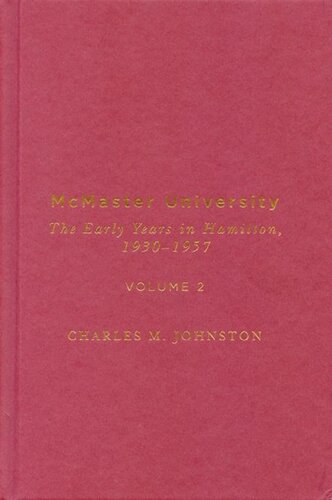

Most ebook files are in PDF format, so you can easily read them using various software such as Foxit Reader or directly on the Google Chrome browser.
Some ebook files are released by publishers in other formats such as .awz, .mobi, .epub, .fb2, etc. You may need to install specific software to read these formats on mobile/PC, such as Calibre.
Please read the tutorial at this link: https://ebookbell.com/faq
We offer FREE conversion to the popular formats you request; however, this may take some time. Therefore, right after payment, please email us, and we will try to provide the service as quickly as possible.
For some exceptional file formats or broken links (if any), please refrain from opening any disputes. Instead, email us first, and we will try to assist within a maximum of 6 hours.
EbookBell Team

5.0
78 reviewsMcMaster University was established in 1887 as a trust to the Baptist constituency of central Canada. This second volume of the university’s history chronicles its transformation from a modest university college into an important university. It is the story of survival through the Depression and the Second World War to eventual emergence as a recognized scientific research centre and of how this role, never envisaged at the time when arts and theology were McMaster’s chief concerns, dictated the university’s divorce from its original Baptist sponsors. McMaster’s move to Hamilton in 1930 coincided with the Depression, a catastrophe that haunted the university throughout the decade, thwarting new programs, forcing economies, and shattering the hopes entertained for the institution during the 1920s. This chastening interlude was followed by war, which further curbed development and created serious financial and enrolment problems, but the war also spurred scientific research, particularly in nuclear physics. Funds for science were sought outside the Baptist constituency, but to be eligible for them a new and separate institution had to be formed, so in 1948 Hamilton College was incorporated and affiliated with McMaster. Members of the arts faculty were disturbed by the growing stress on science, and the university’s attempts to strengthen arts and theology in the 1950s so threatened to overtax its resources that McMaster was forced to seek state aid for its entire operation. In 1957, McMaster was reorganized as a private non-denominational institution, eligible for public funding. Its days as a Baptist university came to an end. Charles Johnston pays tribute to those dedicated and resourceful administrators who, through depression, war, and ideological conflicts, provided the expertise essential to the survival and growth of McMaster. This volume, like its predecessor and successor, will be of interest to anyone concerned with the cultural and intellectual growth of the nation.